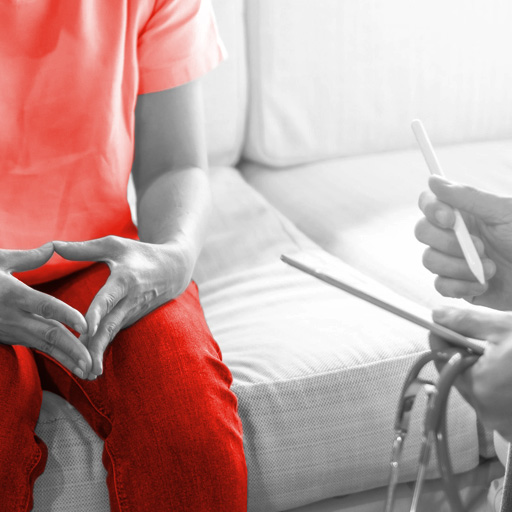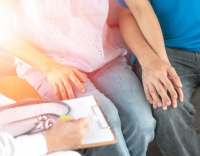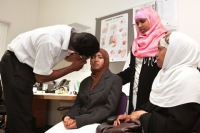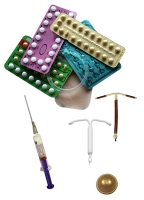Sexual and Reproductive Healthcare Training | e-SRH Programme



Specialist training for doctors, nurses and other healthcare professionals
e-Sexual and Reproductive Healthcare (eSRH) covers the knowledge base to deliver high-quality healthcare in community settings. It is relevant to healthcare professionals around the world.
The eSRH programme has been updated in 2020 to reflect the latest best practice and ensure alignment with the redesigned FSRH Diploma as well as other FSRH qualifications.
A comprehensive e-learning resource on sexual and reproductive healthcare
Written by leading clinical experts in the UK, this programme covers a wide range of themes, such as contraception choices, sexually transmitted infections, psychosexual medicine and safeguarding. It is packed with interactive features such as video clips, animations and real-life case studies, to support your learning.
e-SRH is relevant to a wide range of healthcare professionals working in sexual health, general practice, obstetrics and gynaecology, including doctors, nurses, midwives, health visitors and pharmacists.
Convenient, easy online access
eSRH is available online so you can study in the workplace, at home or even on the move. The programme has been developed by the UK Faculty of Sexual and Reproductive Healthcare (FSRH), part of the Royal College of Obstetricians and Gynaecologists, and Health Education England e-Learning for Healthcare.
Do you work in sexual and reproductive healthcare outside the UK?
Alongside eSRH, the FSRH International Certificate of Knowledge in Sexual and Reproductive Health is a complementary programme specifically designed for healthcare professionals outside the UK.
This 12-month package includes:
- access to award-winning online SRH content tailored to international audiences
- an online assessment – with an FSRH certificate available on successful completion
- affiliate membership of the FSRH for one year – including free access to guidance, standards and many other resources
------
eIntegrity programmes are developed by NHS Health Education England’s e-Learning for Healthcare programme (HEE e-LfH).
The programmes are high quality self-directed learning programmes. They are designed to support training and CPD and are excellent resources alongside other traditional teaching methodologies. They have been developed by the UK NHS for use in the NHS. However, many of the programmes have international relevance, particularly the specialty training programmes which are often mapped to UK specialty training curricula.
------
Module 1: Basic Anatomy and Physiology
This module introduces the anatomy and physiology of the male and female reproductive systems.
Module 2: Consent and History Taking
This module looks at medical history taking, including sexual history taking and risk assessment for sexually transmitted infections (STIs) and pregnancy.
Module 3: Contraceptive Choices
This module describes, in detail, all the contraceptive methods currently available in the UK.
Module 4: Emergency Contraception
This module details the different methods of emergency contraception, including their indications and use. It explores the effectiveness of each method as well as how to advise women when to take a pregnancy test. It addresses the advantages and disadvantages of each method and provides guidance around conducting an effective consultation with a woman requiring emergency contraception.
Module 5: Contraception: Complications/Side Effects
This module addresses bleeding problems and other side effects atttributed to the use of hormonal contraception. They provide step-by-step practical guidance on how to manage side effects and ensure continuance of the method by the user.
Module 6: Planning Pregnancy
This module addresses how to conduct a pre-conception consultation, including lifestyle factors, risks, fertility implications and complications of existing medical conditions that could impact on pregnancy.
Module 7: Unintended Pregnancy and Abortion
This module discusses unintended pregnancy, how to conduct a consultation with women seeking abortions or those who are undecided. It also gives a synopsis of abortion procedures and referral pathways for obtaining termination of pregnancy. It gives a brief overview of the legislative framework for conducting abortion legally in the UK. This is governed by the Abortion Act 1967 (amended 1990), which does not apply equally to all countries in the UK. The position in Northern Ireland is mentioned briefly as abortion in that country is not covered by the 1967 Act.
Module 8: Early Pregnancy
This module details the symptoms of early pregnancy, including complications and how to read a pregnancy test appropriately. It also discusses when future pregnancy tests may be required.
Module 9: Sexually Transmitted Infections (STIs)
This module details current tests used for STI screening, including HIV and BBV. It discusses how to screen asymptomatic patients, as well as the management of abnormal vulvo-vaginal symptoms, pelvic pain, genital ulceration, warts and herpes. It outlines the principles of partner notification when dealing with STIs.
Module 10: Needs of Specific Groups
This module addresses identified groups within society and some of their specific SRH needs. It discusses where these needs should be taken into account when taking a medical history and responding through treatment and management accordingly.
Module 11: Adult and Child/Young Person Safeguarding/Child Protection
This module addresses procedures and referral pathways in relation to both children and young people and adult safeguarding. More specifically, it addresses key areas within these, including domestic violence, female genital mutilation (FGM), sexual assault and the management of STI, emergency contraception, post exposure prophylaxis (PEP) and child sexual exploitation.
Module 12: Psychosexual Medicine
This module provides an introduction to the concept of sexual dysfunction and the impact of sexual dysfunction on patients. It discusses the causes, initial assessment, and referral pathways involved in the management of sexual dysfunction.
Module 13: Cervical Screening
This module outlines the principles of cervical screening programmes, as well as causes and prevalence of cervical abnormalities.
Module 17: Additional Training in Subdermal Contraceptive Implants (SDI)
- Local Anaesthesia for Subdermal Implant Insertion and Removal
- SDI: Summary of Method
- SDI: Insertion and Removal
- Managing Impalpable Implants
Module 18: Additional Training in Intrauterine Contraceptive Methods (IUT)
- Local Anaesthesia and Analgesia for IUD/IUS Insertion
- IUT: Summary of Method
- IUT: Facilitating Choice
- IUT: Insertion
- IUT: Removal
- IUT: Managing Unexpected Situations and Complications

A high-quality sexual and reproductive healthcare course

Relevant to doctors, nurses, pharmacists and other healthcare professionals in the UK and overseas

Developed by the UK Faculty of Sexual and Reproductive Healthcare
Starting and Using Estrogen Containing Hormonal Contraceptives - 1
This session looks at choice of contraceptive methods which contain estrogen, often termed 'combined hormonal contraception'. It gives an overview of the benefits and risks for these methods.
Up-to-date and tailored to your workforce, eSRH is an excellent learning resource for anyone working in a sexual and reproductive healthcare role. It’s interactive, accessible and convenient, and the certificates of completion are so useful for your portfolio.
e-SRH has revolutionised training in sexual and reproductive healthcare. This improved training is saving the NHS £7.9 million a year.












